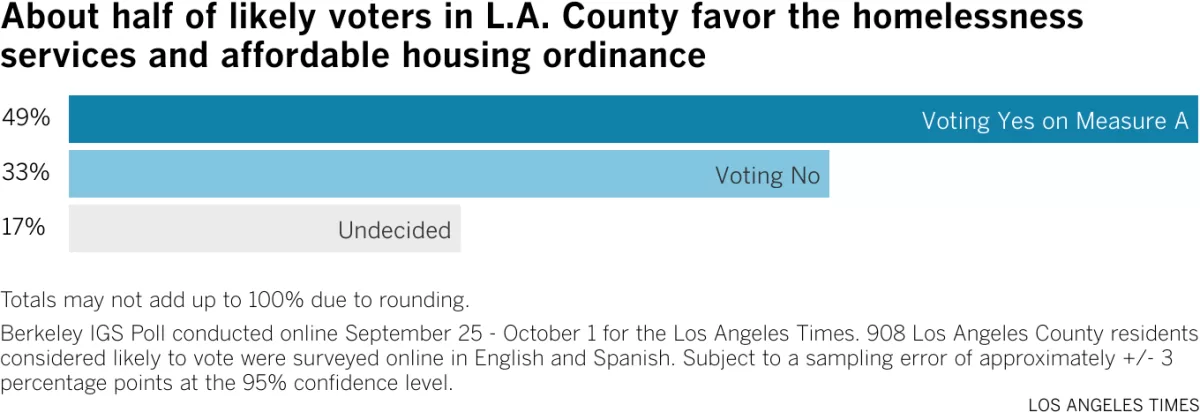A measure on the November ballot that would double the county’s quarter-percent homeless sales tax is edging closer to the majority it would need to pass in a new poll of likely Los Angeles County voters.
Those saying they would vote for the measure outnumbered those opposing by 49% to 33% in a survey taken in late September, widening its lead by 5 percentage points over responses to an earlier poll. In August, 47% of likely voters said they would vote yes and 36% no. The percentage of voters who were undecided remained at 17%.
The differences, however, fell within the margins of error of the two surveys. The poll, conducted between Sept. 25 and Oct. 1 by the UC Berkeley Institute of Governmental Studies and co-sponsored by The Times, had a margin of error of 3 percentage points.
“When I look at 49% yes in the current poll and 47% in the August poll, in a statistical sense, there really hasn’t been much change,” said Mark DiCamillo, director of the Berkeley IGS Poll.
The new survey reinforces his conclusion that the race is close, DiCamillo said.
He said the late September poll was the first to present likely voters with the official ballot summary that they will see when voting, and this adds to its credibility.
“I like this survey a little more since they are reacting to what they will actually see when voting.” DiCamillo said.
If it passes, Measure A will repeal Measure H, a quarter-percent sales tax approved by voters in 2017 to fund homeless services, and replace it with a half-percent sales tax expected to generate more than $1 billion annually. The new measure would expand the use of that money by earmarking funds to homelessness prevention and housing development.
If not replaced, the Measure H tax would expire in 2027. The new tax, if adopted, would remain in effect unless repealed by voters.
Responses to a second question on the survey showed meager optimism that the funds generated by Measure A would be effective.
Only 33% said they thought Measure A would “greatly reduce homelessness” compared with 38% who thought it would not, leaving 29% undecided.
That response echoed a similar reaction in August to a question about the effectiveness of Measure H. Only 30% of respondents said they were very or somewhat satisfied “with the way the money raised under Measure H has been spent.” Fifty-seven percent were dissatisfied.
“That’s the sticking point on this whole thing,” DiCamillo said. Survey respondents “want to see progress, and they really haven’t seen a lot yet. Our August poll showed some dissatisfaction. There is some skepticism about what this is likely to do.”
A downside for the measure in the survey results is that as the election draws near, voters who haven’t been sold on a measure are more likely to vote no.
“It’s a safer vote,” DiCamillo said. But he added that campaigns have an effect.
“If most of the messages are coming from the yes side, that is definitely a plus,” he said. “Really all they need to do is bring 3 or 4 points to their side.”
Proponents of Measure A have raised about $4 million to promote it, and their campaign is just ramping up, said Tommy Newman, vice president of public affairs for United Way of Greater Los Angeles, one of the measure’s main backers.
“We’ve started knocking on people’s doors and doing volunteer phone banks every week,” Newman said. Information promoting the measure has also been mailed.
In speaking with voters, the campaign has found those still undecided receptive to the message that services and housing assistance would be at risk for tens of thousands of people if Measure H were not replaced.
Elements of the new measure that were not in Measure H are also appealing, Newman said. Among them are accountability procedures with concrete goals and metrics to measure results, and investments in prevention and affordable housing.
Tabulations of the survey show that Measure A fares better among the young — with 56% in support among those younger than 40 — and the liberal, with 71% in favor. Those earning less than $40,000 annually were most supportive of the issue, with 57% in favor, 37% opposed and only 6% undecided.
The most striking differential was the gender gap. Women favored the measure 60% to only 22% against, while men opposed it with 47% against and 37% in favor.
That could be a positive sign for the campaign. because women usually outnumber men at the polls, DiCamillo said.
“If you’re the proponents, if you had to choose one side, you‘d rather be ahead among women,” he said.
Berkeley ISG will conduct one more poll near the end of this month.
“If we find in late October it is above 50%, I would think its chances for passage would be pretty good,” DiCamillo said.
